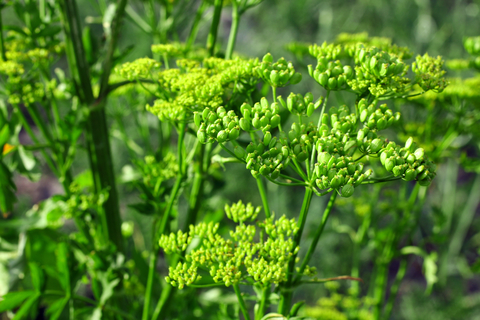Celery Seed

Also known as Apium graveolens, wild celery, Aches des Marais, Ajamoda, Apii Frutus, Celery Fruit, Fruit de Celeri, Smallage, Selleriefruchte, Selleriesamen.
Introduction The Greeks and Romans called it "smallage" and harvested it in the wild for its medicinal properties, especially for "nervous unrest" and loss of appetite. The Romans used it more for cooking than for its medicinal properties. When it was finally grown and harvested in the middle ages it was found to be a wonderful vegetable to add to the dinner table. It was not until the 19th century that the seeds were used as a spice in recipes and pickling. It was associated with funerals and bad luck, and woven garlands of wild celery were often found in Egyptian tombs. The celery used in herbal medicine is a close relative of the celery you can buy in market. The fruit or "seed" is grayish green to brown with a characteristic, slightly bitter, spicy taste. Too much celery seed can overpower a dish, whereas a little brings out flavors in other foods. Celery seed is used in pickles, casseroles, and Bloody Marys.
Constituents Essential oil, with limonene and selinene as the main components, also pinene, cymene, caryophyllene, pinene, santalol, and dihydrocarvone, as well as antioxidant apigenin and isoquerticin.
Parts Used The fruits or "seeds," whole or powdered
Typical Preparations Can be used to make teas, but more often used in cooking. Seldom used in extract or capsule form.
Summary Celery seed is a traditional remedy for nervous stomach. Prior to the Middle Ages, a wild form of celery referred to as selinon, or smallage, was used as a diuretic and a carminative, which is a treatment to reduce intestinal gas. Today, although celery is primarily used for flavor, it has the same effects on digestion. A series of scientific studies conducted 10 to 30 years ago found that celery seed's essential oil contains compounds that are mildly tranquillizing and helpful in relieving arthritic pain. Some recent research suggests that celery seed contains other compounds that stop the carcinogenic effect of environmental toxins in the liver. Other research suggests that essential oils in the seeds may be mildly bactericidal against Campylobacter jejuni, Escherichia coli O157:H7, Listeria monocytogenes, andSalmonella enterica.
Precautions If you use diuretics, it is recommended that you do not use celery seed. The herb does not cause sensitivity to sunlight by itself, but it can cause increased risk of sunburn in people who take prescription ACE inhibitors to control high blood pressure. Large consumption of Celery seed should be avoided while pregnant or nursing.
For educational purposes only. This information has not been evaluated by the Food and Drug Administration. This information is not intended to diagnose, treat, cure, or prevent any disease.
This information courtesy of MOUNTAIN ROSE HERBS, with full, written permission for reuse. For further traditional information concerning Celery Seed, please visit this excellent resource from Botanical.com. Used with full, written permission.






